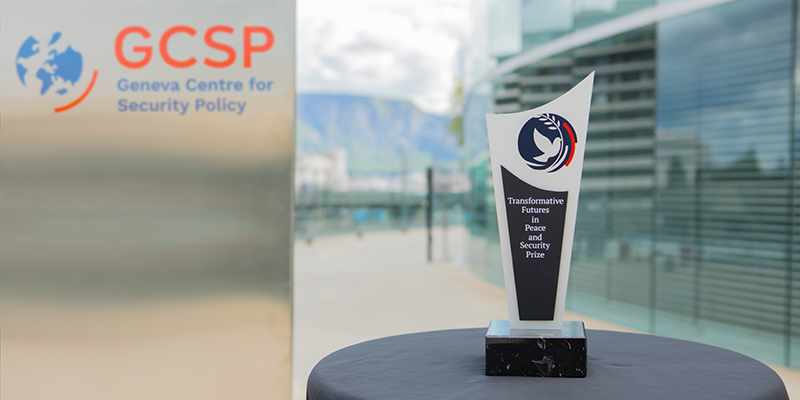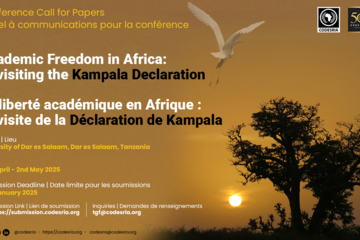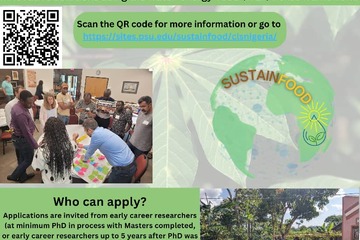Browse
Education

No Preview Available
GCSP launches Prize for Transformative Futures in Peace and Security 2025
Deadline: Mar 20, 2025
Donor: Geopolitics and Global Futures (GCSP)
Grant Type: Grant
Grant Size: Not Available
Countries/Regions: All Countries
Area: Education, Climate Change, Human Rights, Cyber Security, Information Technology, Innovation, Peace & Conflict Resolution
The Geopolitics and Global Futures (GCSP) has launched the Prize for Transformative Futures in Peace and Security to reward groundbreaking concepts that offer exceptional promise in addressing peace and security challenges.
For more information, visit https://www.gcsp.ch/events/apply-2025-gcsp-prize-transformative-futures-peace-and-security
Premium Link: https://grants.fundsforngospremium.com/opportunity/op/gcsp-launches-prize-for-transformative-futures-in-peace-and-security-2025
Read more

By: Baboki Gaolaolwe-Major
Due Date: Mar, 20, 2025
Education
Leave a comment
No Preview Available
Capacity building Programme in VET in Sub-Saharan Africa
Deadline: Feb 27, 2025
Donor: European Commission (EC)
Grant Type: Grant
Grant Size: $100,000 to $500,000
Countries/Regions: Angola, Austria, Belgium, Benin, Botswana, Bulgaria, Burkina Faso, Burundi, Cameroon, Cape Verde, Central African Republic, Chad, Comoros, Congo (Brazzaville), Congo DR, Cote DIvoire (Ivory Coast), Croatia, Cyprus, Czech Republic, Denmark, Djibouti, Equatorial Guinea, Eritrea, Estonia, Ethiopia, Finland, France, Gabon, Gambia, Germany, Ghana, Greece, Guinea, Guinea-Bissau, Hungary, Iceland, Ireland, Italy, Kenya, Latvia, Lesotho, Liberia, Liechtenstein, Lithuania, Luxembourg, Macedonia, Madagascar, Malawi, Mali, Malta, Mauritania, Mauritius, Mozambique, Namibia, Netherlands, Niger, Nigeria, Norway, Poland, Portugal, Romania, Rwanda, Sao Tome And Principe, Senegal, Seychelles, Sierra Leone, Slovak Republic, Slovenia, Somalia, South Africa, Spain, Sudan, Swaziland, Sweden, Tanzania, Togo, Turkey, Uganda, Zambia, Zimbabwe, Serbia, South Sudan
Area: Capacity Building, Democracy & Good Governance, Economic Development, Education, Learning, Vocational Education, Employment & Labor, Innovation, Youth & Adolescents
The European Commission is inviting applications to support the relevance, accessibility, and responsiveness of Vocational Education and Training institutions and systems in third countries not associated to the Programme as a driver of sustainable socio-economic development.
For more information, visit https://ec.europa.eu/info/funding-tenders/opportunities/portal/screen/opportunities/topic-details/ERASMUS-EDU-2025-CB-VET-SSA?isExactMatch=true&status=31094501,31094502&order=DESC&pageNumber=1&pageSize=50&sortBy=startDate
Premium Link: https://grants.fundsforngospremium.com/opportunity/op/capacity-building-programme-in-vet-in-subsaharan-africa
Read more

By: Baboki Gaolaolwe-Major
Due Date: Feb, 25, 2025
Education
Leave a comment

No Preview Available
Exciting Opportunity for Students from the Global South!
The Max Planck Institute for Solid State Research in Germany leads the charge for diversity, inclusion, and equality in science. To address the underrepresentation of young scientists from the Global South, they’ve launched the second edition of their Comp@ss Program!
🔬 This fully-funded internship provides undergraduate students in condensed matter science with the chance to:
Conduct research at one of the world’s top institutes.
Work with partner groups at the University of Stuttgart.
🌟 Special preference for students from least-income countries.
📅 Deadline: January 26, 2025💻 More details & application: https://www.fkf.mpg.de/compass
Spread the word and encourage eligible students to apply for this incredible opportunity! Let's support efforts to create a more inclusive global scientific community.
Read more

By: Baboki Gaolaolwe-Major
Due Date: Jan, 26, 2025
Youth empowerment
+2
Leave a comment

No Preview Available
RFPs: Government of Ireland International Education Scholarships Program 2025
Area: Education, Scholarships, Youth & Adolescents
The Government of Ireland International Education Scholarship (GOI-IES) programme supports high-calibre international students who wish to study at NFQ levels 9 or 10 (master’s, postgraduate diploma or PhD) in Ireland.
For more information, visit https://hea.ie/policy/internationalisation/goi-ies/
Premium Link: https://grants.fundsforngospremium.com/opportunity/op/rfps-government-of-ireland-international-education-scholarships-program-2025
Read more

By: Baboki Gaolaolwe-Major
Due Date: Mar, 5, 2025
Youth empowerment
+1
Leave a comment

Climate Entrepreneurship Exchange
Undergrads: Build Climate Solutions & Win an International Study Trip!
Explore climate change, develop entrepreneurial skills, and create innovative business ideas in this 8-week virtual exchange program connecting 1,100 students from Michigan, Egypt, Libya, and Morocco.
Key Details:
Teams tackle climate issues with business solutions.
Top teams win immersive study trips to Michigan or Morocco.
Cohorts run from February 2025 to June 2026.
Apply by December 20, 2024.
Contact: wdi-virtual@umich.eduLearn more and apply: https://climate-entrepreneurs.org/
Read more

By: Baboki Gaolaolwe-Major
Due Date: Dec, 20, 2024
Youth empowerment
+1
Leave a comment

Conference – Call for Papers: Academic Freedom in Africa: Revisiting the Kampala Declaration
CODESRIA invites submissions for the conference “Academic Freedom in Africa: Revisiting the Kampala Declaration,” happening April 29–May 2, 2025, at the University of Dar es Salaam, Tanzania.
Themes:
Academic freedom and governance
Neoliberalism and higher education
Gender, diversity, and inclusion in academia
Indigenous knowledge and decoloniality
Financing and resources in African universities
Key Dates:
Submission Deadline: January 10, 2025
Notification: February 28, 2025
Papers (5,000–7,000 words) must align with CODESRIA guidelines. Travel and accommodation will be provided for selected authors.
Contact tgf@codesria.org for inquiries. For more information: https://codesria.org/conference-call-for-papers-academic-freedom-in-africa-revisiting-the-kampala-declaration/
Read more

By: Baboki Gaolaolwe-Major
Due Date: Jan, 10, 2025
Culture and society
+1
Leave a comment
No Preview Available
Celebrating Professor Paul Tiyambe Zeleza's 70th Birthday with an International Conference
Howard University will host an International Conference from May 21–23, 2025, to honor the remarkable career and contributions of Professor Paul Tiyambe Zeleza on his 70th birthday.
The event will bring together scholars, researchers, and practitioners to explore Professor Zeleza's work and its lasting impact on various fields of study. Selected presentations from the conference will be published.
Call for Papers
Abstracts are invited for presentations addressing themes related to Professor Zeleza’s contributions. Submissions should present original research, reflections, or critiques.
Submission Details:
Abstracts: 250–300 words (scope, objectives, and key arguments)
Bio: 150 words with institutional affiliation
Deadline: February 1, 2025
Notification of Acceptance: February 15, 2025
Submit to: ptz70birthday@gmail.com
This conference will provide a unique opportunity to celebrate Professor Zeleza’s legacy and engage in contemporary academic debates.
For more information, contact the Organizing Committee at ptz70birthday@gmail.com or call (202) 238-2327.
Read more: https://cfas.howard.edu/conference-zeleza-70th
Read more

By: Baboki Gaolaolwe-Major
Due Date: Feb, 1, 2025
Education
Leave a comment

Join the 2025 SustainFood Collaborative Learning School!
Are you passionate about the Water-Energy-Food (WEF) Nexus and looking to make a lasting impact? The SustainFood CLS will take place May 5–16, 2025, in Ona Ara, Ibadan, Nigeria, bringing together early-career researchers, farmers, policymakers, and stakeholders to tackle pressing environmental challenges. 🌾💧⚡
🎓 Who can apply?
PhD candidates (Master’s completed) or early-career researchers (up to 5 years post-PhD)
Researchers from the US, Africa, or EU NexusNet countries with WEF Nexus-related work
💼 What to expect:
Virtual preparatory sessions before the in-person program
Collaborative learning to drive sustainable solutions
Networking opportunities beyond the CLS
📅 Deadline: January 12, 2025📧 Secure your advisor's reference letter and apply today!
For more info or to apply, contact Nathan Weyandt at ndw5072@psu.edu. Let’s shape sustainable food systems together! Link: https://sustainfood.psu.edu/clsnigeria/
Read more

By: Baboki Gaolaolwe-Major
Due Date: Jan, 12, 2025
Agri-food systems
+2
Leave a comment
No Preview Available
Call for Papers: African Intellectual History
Join the conversation marking 25 years since Philip Zachernuk’s Colonial Subjects (2000). Explore the evolution of African intellectual history, from indigenous thought to modern ideas shaping politics, law, culture, and more.
📅 Submission Deadline: January 10, 2025📍 Location: Maryland, USA
Key themes include:✅ Indigenous African political thought✅ Identity and nationhood✅ African medical ideas✅ Biographies of unacknowledged thinkers
Submit a 200-word abstract and bio to jonathan.roberts@msvu.ca Read more: https://networks.h-net.org/group/announcements/20051259/cfp-african-intellectual-history-25-years-philip-zachurnuks-colonial
Let’s reflect, rethink, and reimagine African ideas shaping history!
Read more

By: Baboki Gaolaolwe-Major
Due Date: Jan, 10, 2025
Culture and society
+1
Leave a comment
No Preview Available
RFPs: Feminist Global Development and Foreign Policy Fellowship Program
Deadline: Dec 02, 2024
Donor: Heinrich Böll Foundation
Grant Type: Fellowship
Grant Size: Not Available
Countries/Regions: Afghanistan, Algeria, Angola, Argentina, Armenia, Azerbaijan, Bahrain, Bangladesh, Belarus, Benin, Bhutan, Bolivia, Botswana, Brazil, Brunei, Bulgaria, Burkina Faso, Burundi, Cambodia, Cameroon, Cape Verde, Central African Republic, Chad, Chile, China, Colombia, Comoros, Congo (Brazzaville), Congo DR, Costa Rica, Cote DIvoire (Ivory Coast), Cuba, Czech Republic, Djibouti, Dominican Republic, Ecuador, Egypt, El Salvador, Equatorial Guinea, Eritrea, Ethiopia, Gabon, Gambia, Georgia, Ghana, Guatemala, Guinea, Guinea-Bissau, Honduras, Hungary, India, Indonesia, Iran, Iraq, Israel, Japan, Jordan, Kazakhstan, Kenya, South Korea, North Korea, Kuwait, Kyrgyzstan, Laos, Lebanon, Lesotho, Liberia, Libya, Madagascar, Malawi, Malaysia, Maldives, Mali, Mauritania, Mauritius, Mayotte, Mexico, Moldova Republic Of, Mongolia, Morocco, Mozambique, Burma(Myanmar), Namibia, Nepal, Nicaragua, Niger, Nigeria, Oman, Pakistan, Palestinian Territories, Panama, Paraguay, Peru, Philippines, Poland, Puerto Rico, Qatar, Reunion, Romania, Russia, Rwanda, Saint Helena, Sao Tome And Principe, Saudi Arabia, Senegal, Seychelles, Sierra Leone, Singapore, Slovak Republic, Somalia, South Africa, Sri Lanka, Sudan, Swaziland, Syria, Tajikistan, Tanzania, Thailand, East Timor (Timor-Leste), Togo, Tunisia, Turkey, Turkmenistan, Uganda, Ukraine, United Arab Emirates, Uruguay, Uzbekistan, Venezuela, Viet Nam, Western Sahara, Yemen, Zambia, Zimbabwe, South Sudan
Area: Community Development, Politics, Leadership, Research, Tourism & Travel, Gender Equality, Women & Gender
The Heinrich Böll Foundation’s, Washington DC Office is pleased to announce the third iteration of the Feminist Foreign and Development Policy Fellowship.
For more information, visit https://us.boell.org/en/2024/11/15/feminist-global-development-and-foreign-policy-fellowship-2025-csw-69
Premium Link: https://grants.fundsforngospremium.com/opportunity/op/rfps-feminist-global-development-and-foreign-policy-fellowship-program
Read more

By: Baboki Gaolaolwe-Major
Due Date: Dec, 2, 2024
Youth empowerment
+2
Leave a comment

No Preview Available
CFAs: Visiting Fellowships for Scholars from the Global South
Deadline: Feb 24, 2025
Donor: Centre for Research in the Arts, Humanities and Social Sciences
Grant Type: Fellowship
Grant Size: Not Available
Countries/Regions: Afghanistan, Algeria, Angola, Argentina, Bangladesh, Belize, Benin, Bhutan, Bolivia, Botswana, Brazil, Burkina Faso, Burundi, Cambodia, Cameroon, Cape Verde, Central African Republic, Chad, China, Colombia, Comoros, Congo (Brazzaville), Congo DR, Costa Rica, Cote DIvoire (Ivory Coast), Cuba, Djibouti, Dominica, Dominican Republic, Ecuador, Egypt, El Salvador, Equatorial Guinea, Eritrea, Ethiopia, Fiji, Gabon, Gambia, Ghana, Grenada, Guatemala, Guinea, Guinea-Bissau, Guyana, Haiti, Honduras, India, Indonesia, Iran, Iraq, Jamaica, Jordan, Kenya, Kiribati, North Korea, Kyrgyzstan, Laos, Lebanon, Lesotho, Liberia, Libya, Madagascar, Malawi, Malaysia, Maldives, Mali, Marshall Islands, Mauritania, Mauritius, Mexico, Micronesia Federated States Of, Mongolia, Montserrat, Morocco, Mozambique, Burma(Myanmar), Namibia, Nauru, Nepal, Nicaragua, Niger, Nigeria, Niue, Pakistan, Palau, Palestinian Territories, Panama, Papua New Guinea, Paraguay, Peru, Philippines, Rwanda, Saint Helena, Saint Lucia, Saint Vincent And The Grenadines, Samoa, Sao Tome And Principe, Senegal, Sierra Leone, Solomon Islands, Somalia, South Africa, Sri Lanka, Sudan, Suriname, Swaziland, Syria, Tajikistan, Tanzania, Thailand, East Timor (Timor-Leste), Togo, Tokelau, Tonga, Tunisia, Turkmenistan, Tuvalu, Uganda, Uzbekistan, Vanuatu, Venezuela, Viet Nam, Wallis And Futuna, Yemen, Zambia, Zimbabwe, South Sudan
Area: Politics, Education, Social Justice, Research, Science
The Centre for Research in the Arts, Humanities and Social Sciences (CRASSH) at the University of Cambridge is inviting applications for funded Visiting Fellowships for scholars from the Global South.
For more information, visit https://www.crassh.cam.ac.uk/research/fellowships/global-south-fellowships/#1-about
Premium Link: https://grants.fundsforngospremium.com/opportunity/op/apply-for-visiting-fellowships-for-scholars-from-the-global-south
Read more

By: Baboki Gaolaolwe-Major
Due Date: Feb, 24, 2025
Education
Leave a comment

No Preview Available
International Association of Genocide Scholars Conference Abstracts due Nov. 25th
The 17th Biennial Meeting of the International Association of Genocide Scholars deadline for abstracts is rapidly approaching.
Theme:The 2025 International Association of Genocide Scholars conference aims to critically examine the progress made, obstacles faced, and opportunities presented in the ongoing quest to fulfil the pledge of "Never Again."Conference Dates: 20-25 October 2025, with cultural events both before/after the conference.Location: Johannesburg, South AfricaFor more information: https://networks.h-net.org/group/announcements/20051007/international-association-genocide-scholars-conference-abstracts-due
Read more

By: Baboki Gaolaolwe-Major
Due Date: Nov, 25, 2024
Education

Leave a comment